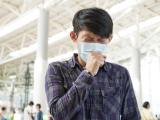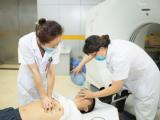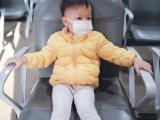Jun 2, 2003 (CIDRAP News) Available diagnostic tests for SARS (severe acute respiratory syndrome) are not sensitive enough to reliably detect the SARS virus in the first few days of illness, a limitation that makes the disease harder to control, the World Health Organization (WHO) said today.
Shedding of the virus is relatively low in the first few days and doesn't peak until about 10 days after the onset of illness, the agency said in a statement. "This unusual behavior creates the need for tests having a particularly high sensitivity. Such tests do not yet exist."
The statement added, "Available tests, though developed with impressive speed, are unable reliably to detect SARS virus or its genetic material during the earliest days of illness. The low sensitivity of current virus detection tests is a particular challenge for SARS control, as patients are capable of infecting others during the initial phase and therefore need to be reliably detected and quickly isolated."
The WHO also said tests that detect antibody to SARS, as opposed to the virus itself, do not work reliably until about the 10th day of illness. "WHO continues to recommend use of its case definitions, based on clinical presentation, distinct chest x-rays, and history of possible contact with SARS patients, to detect suspect and probable cases and make management decisions," the statement said.
The WHO statement coincided with an announcement that the Centers for Disease Control and Prevention (CDC) is making its polymerase chain reaction (PCR) test for the SARS virus available to about 100 specialized laboratories around the country. The experimental test can detect the virus in "a couple of hours," versus the several days it takes to grow the virus in culture, the Department of Health and Human Services (HHS) said in a news release.
"HHS' Food and Drug Administration (FDA) worked closely with CDC to develop appropriate information for patients and health professionals in order to make the test available on an investigational basis," officials said. "Because information about the test's performance is still being collected, patients will be asked for written consent before the test is used."
Use of the PCR test in more patients and settings will yield more information on its accuracy and reliability and how it can be improved, which will support the development of approved tests, HHS said.
The WHO and HHS announcements followed a week in which the spread of SARS slowed in Asia but found new life in Toronto. The WHO reported only two new cases in mainland China in the past two days, and the Associated Press reported that for the first time in weeks, China had no new cases today.
Taiwan reported only eight new cases in the past 2 days, bringing its cumulative total to 684, the WHO said today. Taiwan's outbreak had grown rapidly in the first 3 weeks of May, apparently because a lapse in infection control at a hospital led to a large number of exposures, according to earlier WHO reports. New probable cases in Taiwan peaked at 65 on May 22 and have since declined, with single-digit numbers reported for the past 4 days.
Singapore was removed from the WHO list of areas with recent local transmission as of May 31, after 20 days with no new locally acquired SARS cases. Singapore had been scheduled to come off the list May 11, but a new case was reported that day. In announcing the change in status on May 30, Dr. David Heymann, WHO's communicable diseases director, said, "This is an inspiring victory that should make all of us optimistic that SARS can be contained everywhere."
Events went the other way in Toronto, which was put back on the list of areas with recent local transmission on May 26. That followed Health Canada's report of new clusters of 26 suspected and 8 probable cases linked to four Toronto hospitals, according to the WHO. The first cluster was reported to the WHO May 23. The new cases led health authorities to urge more than 7,000 people to quarantine themselves, according to AP reports last week.
A report by the Toronto Star today said a 60-year-old Toronto woman died of SARS yesterday, bringing total SARS deaths in the Toronto area to 31. The report said 487 healthcare workers and 5,237 other people remained in quarantine. The newspaper reported May 31 that nurses at North York General Hospital in Toronto charged that hospital officials had ignored warnings from two emergency room nurses of a new cluster of possible SARS cases in mid-May.
The WHO reported a total of 27 new SARS cases today, bringing the cumulative total to 8,384, with 770 deaths. The agency said 5,402 people64% of the totalhave recovered.
See also:
WHO SARS site
http://www.who.int/csr/sars/en/
CDC SARS site
http://www.cdc.gov/ncidod/sars/index.htm



















